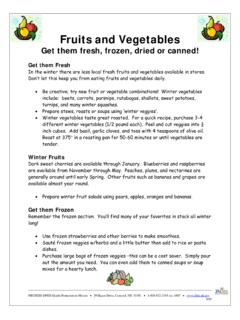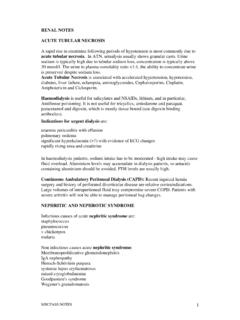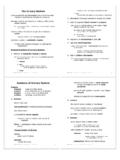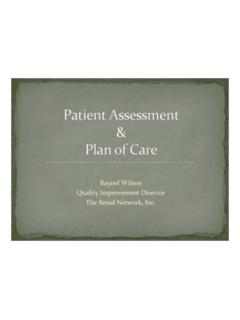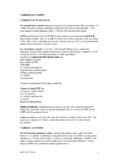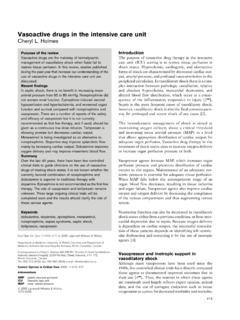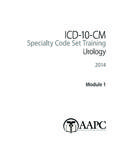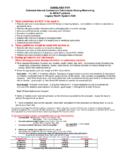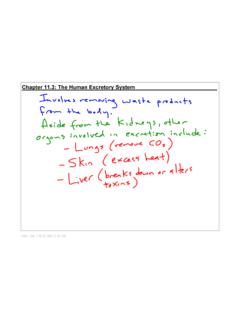Transcription of The Renal Diet - dietsoftware.com
1 The Renal diet A Guide to Eating Healthier for Hemodialysis Patients 2 Table of Contents Introduction Page 3 Controlling Your Phosphorus Page 4 Controlling Your Potassium Page 5 Controlling Your Sodium Page 6 Controlling Your Protein Page 7 Controlling Your Fluid Intake Page 8 Grocery List Suggestions Page 9 Fast Food Facts for the Renal Patient Page 11 Dining Out for the Dialysis Patient Page 16 Smart Snacking Choices Page 18 Renal Friendly Holiday Food List Page 19 Cookbooks for the Kidney Patient Page 22 Renal References Page 24 Sources Cited Page 25 This information is a guide for you and your family.
2 The purpose is to help you learn more about your health. Be sure to follow any instructions your healthcare provider gives you for your special needs. If you have any questions, or there is anything you do not understand, please ask your doctor or dietician. 3 Introduction Eating well is an important part of your treatment and can help you feel better. A new diet is essential part to your treatment process. Not only will it help you feel better, it can also help you avoid complications of your Renal disease such as fluid overload, high blood potassium, bone disease, and weight loss.
3 Because every individual is different and their needs unique, the following dietary advice should be given depending on a number of factors and discussion with your Renal dietician. These factors include: stage of your Renal disease, type of treatment you are on, laboratory results, and presence of other medical conditions. Kidney function is essential for removing the waste material from food that you eat. The kidneys excrete a dietary protein called urea, as well as sodium, potassium, and phosphate. These substances can build up in the body if kidney function is impaired.
4 Following a strict diet can lessen this accumulation and its effects. Hemodialysis Patients should monitor and limit their intake of the following: Potassium Phosphate Sodium Fluids 4 Controlling Your Phosphorus Phosphorus is a mineral that healthy kidneys get rid of in the urine. In kidneys that are failing, phosphorus builds up in the blood and may cause many problems including muscle aches and pains, brittle, easily broken bones, calcification of the heart, skin, joints, and blood vessels.
5 To keep your phosphorus levels in check, consider the following tips: 1. Limit high phosphorus foods such as: Meats, poultry, dairy and fish (you should have 1 serving of 7-8 ounces) Milk and other dairy products like cheese ( you should have one 4 oz. serving) 2. Avoid high phosphorus foods such as: Lima Beans, Black Beans, Red Beans, Black-eyed Peas, White Beans, and Garbanzo Beans Dark, whole or unrefined grains Refrigerator doughs like Pillsbury Dried vegetables and fruits Chocolate Dark colored sodas 3.
6 Don t forget to take your phosphate binders with meals and snacks. Your doctor will prescribe a medication called a phosphate binder which will be some type of polymer gel or calcium medication. You need to take your phosphate binder as prescribed by your doctor. Often you will take a phosphate binder with every meal and snack. 4. Usually your diet is limited to 1000 mg of phosphorus per day. 5 Controlling Your Potassium Potassium is an element that is necessary for the body to keep a normal water balance between the cells and body fluids.
7 All foods contain some potassium, but some contain larger amounts. Normal kidney function will remove potassium through urination. Kidneys that are not functioning properly cannot remove the potassium in the urine, so it builds up in the blood. This can be very dangerous to your heart. High potassium can cause irregular heart beats and can even cause the heart to stop if the potassium levels get to high. Typically, there are no symptoms for someone with a high potassium level. If you are concerned about your potassium level, check with your doctor, and follow the tips below.
8 Usually a Renal patient s diet should be limited to 2000 mg of potassium each day. The following foods are high in potassium: Bananas Avocado Oranges Orange Juice Prunes Prune Juice Tomatoes Tomato Juice Tomato Sauce Cantaloupe Tomato Puree Honeydew Melon Nuts Papaya Chocolate Red Beans Milk White Beans Lima Beans Garbanzo Beans Black Beans Lentils Split peas Baked Beans Specially Prepared Potatoes: 1. Peel and slice into 1/8 inch pieces. 2. Soak 1 cup potatoes in 5 cups of water for 2 hours. 3. Drain and rinse and drain.
9 4. Cook in a large amount of water. 5. Drain and mash, fry or serve plain. 6 Controlling Your Sodium Sodium, or sodium chloride, is an element that is used by all living creatures to regulate the water content in the body. Usually a sodium restriction comes in the form of No Added Salt. This is necessary because a greater intake of sodium will result in poorly controlled blood pressure and excessive thirst which can lead to difficulty adhering to the fluid restrictions in your diet . To limit your sodium, you should.
10 Avoid table salt and any seasonings that end with the word salt Avoid salt substitutes (they contain potassium) Avoid salty meats such as bacon, ham, sausage, hot dogs, lunch meats, canned meats, or bologna Avoid salty snacks such as cheese curls, salted crackers, nuts, and chips Avoid canned soups, frozen dinners, and instant noodles Avoid bottled sauces, pickles, olives, and MSG 7 Controlling Your Protein Protein is important to aid in growth and maintenance of body tissue.



